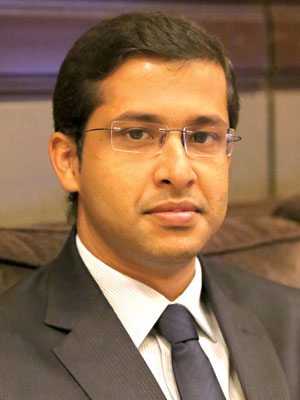
As MD and CEO of Life Cell International, Mayur Abhaya oversees a state-of-the- art facility to store stem cells of newborns as a guard against future diseases. In a conversation with ENNs Pradeesh Chandran, he talks about the growth of the company and the road ahead

MD and CEO of Life Cell International,
What do you do at Life Cell?
At Life Cell, we preserve the umbilical cords of new born babies. We preserve them for various treatments and drug conditions. It is also being used in research for many other organ and tissue regeneration like heart diseases, diabetes and many other body regeneration. We preserve them at our Chennai unit, which is the largest in the country. More than one lakh parents have stored their stem cells with us. We started our operation in 2004 in collaboration with Cryo Cell, which is the worlds largest and first stem cell bank created in the US.
Stem cell banking is still in its infancy in India, having tapped just 1 per cent of the market. What are its growth drivers?
We believe that awareness, affordability, all those has to be addressed for the penetration to increase. In the last one year we have done an awareness creation and making people aware that this is far more affordable. If you see our volumes, they have gone up by 3 times in the last twelve months. The Indian market is of high opportunity.

When it comes for stem cell banking, why are parents opting for it?
The fact that the umbilical cord can be easily collected at birth without any harm to the mother and baby, and can be preserved for a lifetime is a very attractive proposition for the parents. It is the purest form of stem cell as it doesnt have any damage since it is collected after ten minutes after the child is born and you can have a good match within the family also. In the medical science going forward, the benefits of stem cell will increase and it is only once a life time opportunity. Lot of parents say that they have the ability to do it.
Do you think the parents who approach for stem cell banking are really aware of its merits?
The minimum cost of this kind of technique is Rs. 20,000 and nobody will spend this sort of money without understanding. They talk to their friends, families, doctors and gynaecologists and then they take the view on this. They talk to our company also and then we educate them about the benefit and the practice itself.
What are the regulations in stem cell banking and how are you planning to clear peoples concerns?
We dont think regulatory pain points are there. Regulation is a necessary aspect of every service. For a very high quality service like this, you know the banks should have good quality standard. If we dont have a good quality standard it will do a lot more harm. We are working with certain standard that at least those kind of issues does not happen. When we started at 2004 there were no guidelines and in 2009 we established guidelines and we complied with them. In the early years, we were adhering to the blood banking guidelines; now they have separate guidelines for stem cell banking.

Do you work with hospitals to create awareness?
Yes, we do work with various hospitals for creating awareness among people. The hospitals run workshops where the parents are given awareness on various topics. For example in the countries like the US, it is mandatory that every mother should be informed before child birth the value of stem cell banking. The stem cell can be stored for a lifetime as there is no time limit or expiry date.
Stem cell therapy has faced opposition from the religious as well as the traditionalists. Does stem cell banking also face such oppositions?
There was no opposition for stem cell therapy, the issue was that lot of people were taking stem cell from the embryo. That made a controversy where, you take the embryonic stem cell. The umbilical cord has no controversy as this is collected without any pain to the mother or the baby. So therefore there is no ethical controversy.
“The umbilical cord has no controversy as this is collected without any pain to the mother or the baby. So, therefore, there is no ethical controversy”
Is there a body or association which work for creating speedy awareness of the stem cell banking?
Under the ambit of the association of stem cell banks of India, we are working on joint initiatives to speed up the awareness of the stem cell benefit to the country.
Pricing is still an important factor when parents consider stem cell banking. Do you see it coming down in the near future? Have there been technological advancements that may bring down the cost of stem cell banking?
Price is not a critical factor in stem cell banking. If you track the previous growth of the sector in the country the prices are coming down constantly over a period of time. Anything which is a volume service can be scaled up. The prices will become more affordable going forward. In the last twelve months we have seen the three times volume growth and now we are growing at around 4000 new signups every month. The umbilical cords are stored in our Chennai facility but we have presence in over top 150 cities across the country.
Be a part of Elets Collaborative Initiatives. Join Us for Upcoming Events and explore business opportunities. Like us on Facebook , connect with us on LinkedIn and follow us on Twitter , Instagram.












